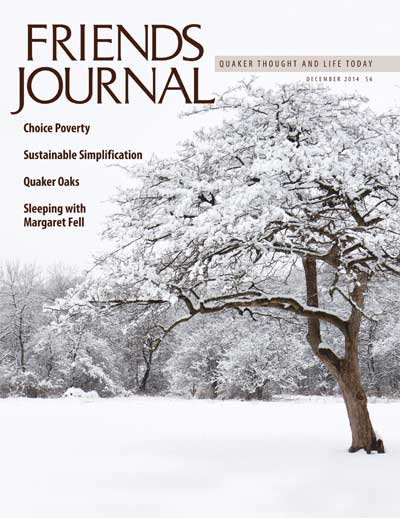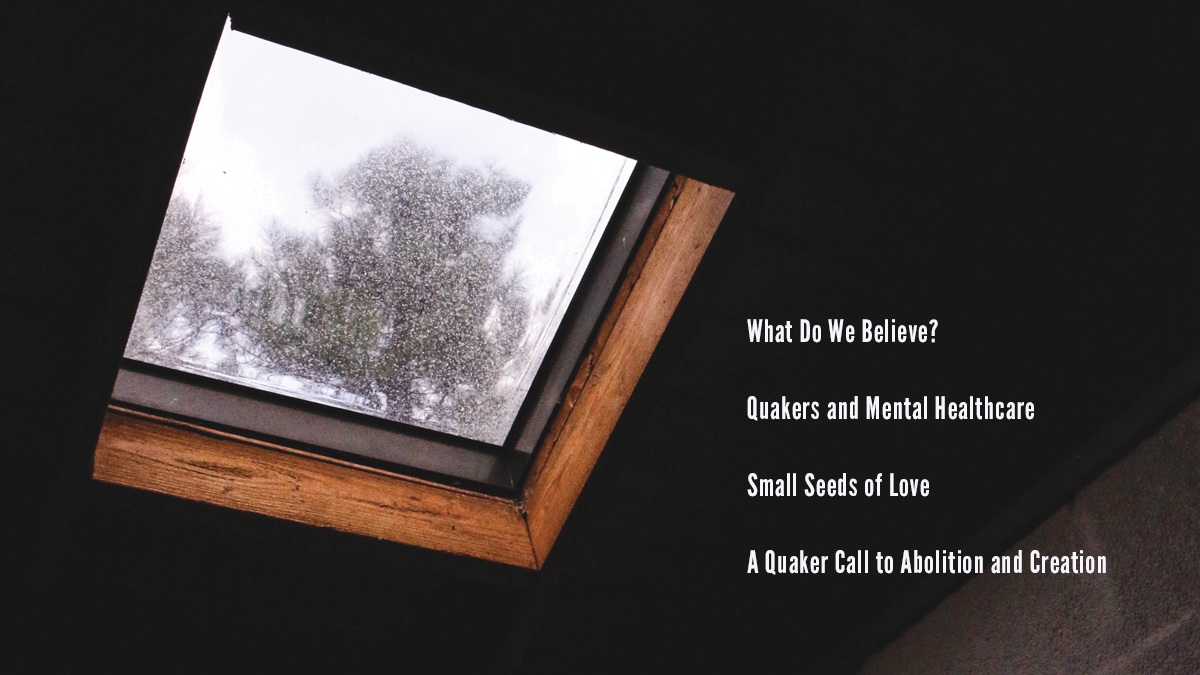Is there a crying need for Quaker saints? Let’s break down this title. “Crying” is a bit emotional, but basically it means urgent. “Need” and “Quaker” seem clear enough, but “saints” is a bit ambiguous: sanctimoniously off-putting yet faintly appealing. Still, Quakers do value the lived life over traditional religiosity: right beliefs, sacraments, and “churchy” liturgies. Saints are those who’ve stood the test of time and careful scrutiny, and if we look past the Catholic elite and read “saints” as good people who helped others at a personal sacrifice, it’s a usable term for us, one that brings to mind Mohandas Gandhi and the Dalai Lama, as well as certified Western icons like George Fox, Margaret Fell, Francis of Assisi, Mother Teresa, and my favorite: Dorothy Day.
There can’t be much disagreement that the Religious Society of Friends could use more of these worthy individuals to enrich our ongoing heritage, but let’s look a bit closer. What is a saint? Is a saint a just person, as Jews say? Or is a saint a great soul—mahatma in the Indian culture—someone who’s an example of human goodness or human potential? Most people see a saint as someone who did things we admire but whom we’re too humble to seek to emulate.
But when we listen closer to the notable Quakers, Gandhi, and other iconic figures, we hear them universally rejecting that assessment. “It’s not us!” they cry with one voice. “We aren’t worthy, just, and heroic examples of human goodness.” Francis of Assisi referred to himself and his followers as donkey turd (a bit harsh for our era) and rejected the common assumption that they were, in themselves, good and worthy “citizens of heaven” (to use Paul of Tarsus’s telling phrase).
What these saints all pointed to was a power greater than themselves, one which had empowered them to live the life that others found worthy. It’s God! It’s Christ in me! It’s the compassionate mystery that lives in all of us! Their focus was God, an unseen source of fresh energy and love for others—not themselves.
Our focus is different. We want to know the specifics of their lives: how they overcame personal and public trials and temptations. We borrow aspects of their lives that suit our condition: Fox’s fearless, prophetic ministry; Gandhi’s nonviolent response to economic and political oppression; and Fell’s role as a strong feminine presence among early Friends. There’s nothing wrong with that assessment of the coterie against the tide, but . . .
The second stage of our relationship with the saintly few (and they are few, given the will of the majority who shape the dominant institutions of our, or any, era) is to put ourselves in touch with the unseen source of passionate love and hope that fueled their lives. As Friends, that option is still there in our Quaker meetings and during our times of private prayer or meditation. This brings us to the heart of the matter: are we willing to put our lives in the hands of the compassionate mystery—God; Spirit; the inner Christ that nurtured Fox, Fell, and many recent worthy ones?
Once we make a commitment—individually and perhaps corporately as well—to the calling to be saints (to paraphrase Paul in Romans 1) in Philadelphia, Pa.; Washington, D.C.; Albuquerque, N.M.; and other Quaker outposts, then we are on our own. How we receive this calling to be saints will vary. I’m not trying to be vague. The Spirit must speak to each seeker in a particular way.
My own experience, however, tells me it’s not quite as open-ended as I’ve implied. Most Quakers tend to relate to God, or Spirit, or whatever words seem appropriate, as either a divine energy or in a personal relationship. My own response is to listen to what’s been called the Inner Voice of Love. In each of us, there is that stirring to new life that longs to enlist our support for God’s kingdom on earth and to make the world a better place to live, with liberty and justice from sea to shining sea. The peaceable kingdom on earth in our own time and place.
When we are faced with the suffering and injustice around us (Paul’s “groaning creation”), it’s that voice of love that is our guide. It’s a compelling—sometimes quiet, sometimes ardent—voice that is yearning to make saints of those who assemble for Quaker meeting each Sunday. Who knows what that will mean: peace work, a change of jobs, staying where you are but looking at life as a citizen of a better world? Who knows? I don’t. But the Inner Voice of Love knows; that of God in you knows. Trust the loving presence of God; trust the will of God for your life; trust the inner voice who wants to make saints to renew the face of the earth—renowned saints like Fox, Gandhi, and Day, and undiscovered saints like David, Betty, Jay, and Kitty.





Francis of Assisi (and others) spend a great deal of time listening for that voice within that signaled the presence of God.,